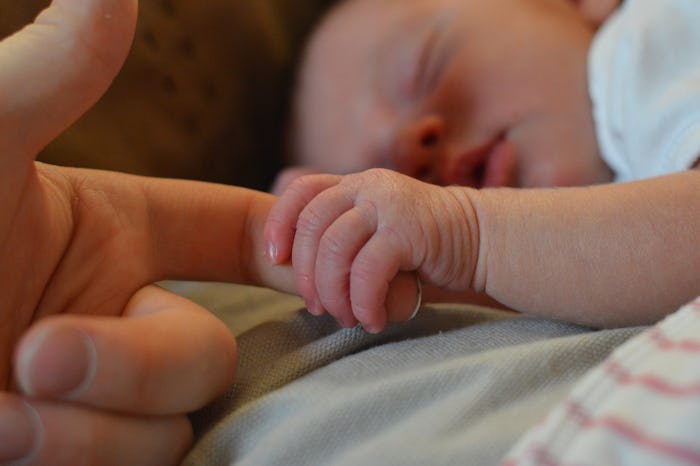Life

A New Test Could Identify Babies At Risk For SIDS, & It’s A Huge Deal
Whenever the topic of SIDS comes up, I think of my friend who lost his daughter. At six months old, she died suddenly in her sleep. My friend wrote poems to mourn her death, but even though he considers himself an open book, her death the one thing he has a hard time talking about. SIDs is the leading cause of infant deaths in the United States, and for the most part, it's unknown what causes it. But now, a new test could identify babies at risk for SIDS, and it’s a huge deal.
Sudden Infant Death Syndrome, or SIDS, is defined by the CDC as the "sudden death of an infant less than 1 year of age." The cause of death is typically unknown, but there are risk factors, including babies sleeping on their stomachs, being exposed to tobacco smoke, or accidental suffocation.
“Parents aren’t doing those things anymore and yet babies are still dying, why would one baby die and another baby in the same situation not die? There has got to be something underlying that,” Dr. Rita Machaalani, manager of the sleep unit at Westmead Children’s Hospital, said in an interview with The Daily Telegraph.
Researchers from Westmead Children’s Hospital in Australia examined 46 babies who died, and 27 of those deaths were from SIDS to determine just that. The study was published in the medical journal Acta Neuropathologica.
Researchers found that babies who died from SIDS had 21 percent less orexin than babies who died from other causes. Orexin is a protein that wakes up babies when they roll over to sleep face down — which means that babies who have less of it may not wake themselves up to roll back into the right position.
“It could be used as a screening tool, but first we need to know if [orexin] is changed in the blood, and those changes are seen in the brain. And then we need to look at genetics to see if it is inherited," Dr. Machaalani said in an interview with Aussie Network News.
Other studies have linked chemicals in the brain to SIDS. In 2010, research from Boston's Children's Hospital linked SIDS to low levels of serotonin, a chemical in the brain that helps regulate breathing.
But SIDS may not be caused by just one thing, medical experts warned. Alexandra Martiniuk, a medical researcher from University of Sydney's George Institute For Global Health, said there are other risk factors. “I have read a lot of coroner reports of children who have died of SIDS...and they do often state that they found the child lying face down or face embedded between mattress and something else,” Dr. Alexandra Martiniuk told The Guardian.
Other experts warn it's too early to tell if any solution will come from the study.
“While promising...the sample size is very small," Dr. Rachel Y. Moon, head of the Task Force on Sudden Infant Death Syndrome at the American Academy of Pediatrics, told Romper. "Much more work needs to be done to confirm these data and then to determine whether an appropriate intervention can be developed.”
More research needs to be done on a wider scale. But the study's findings give hope to parents, and Machaalani said that the development of a nasal spray that increases orexin levels in babies could be a possibility. Such a solution would mean so much to parents everywhere. And especially to people like my friend.
"For many of the families, particularly those who follow all the guidelines, this sort of finding shows there is something wrong with their child, that it is not something they did, and that must give them a bit of comfort," Machaalani said, according to POPSUGAR.